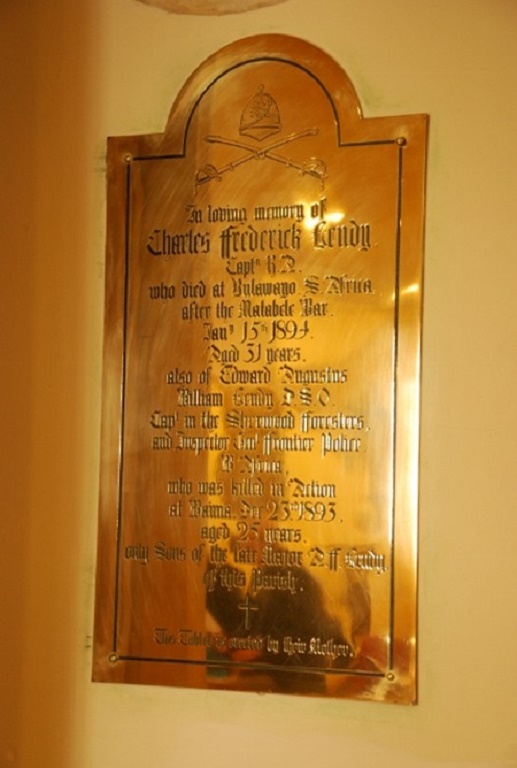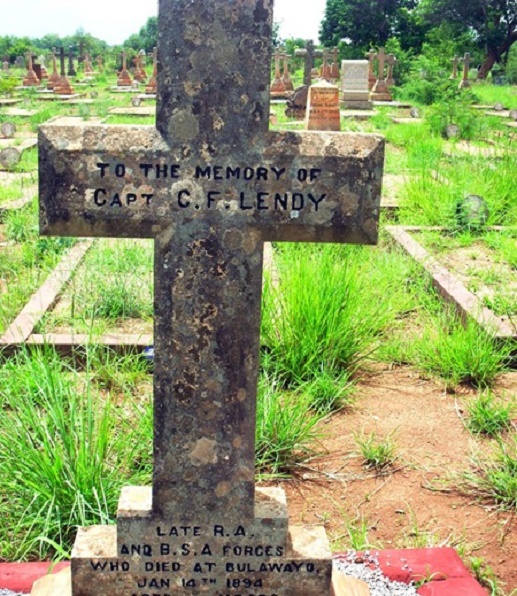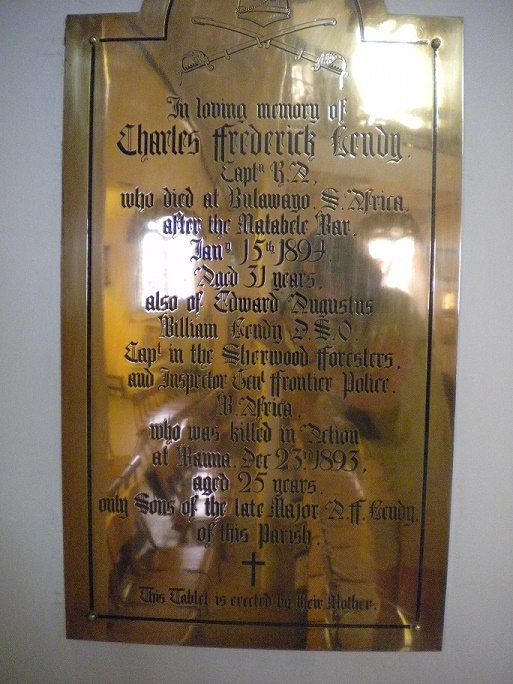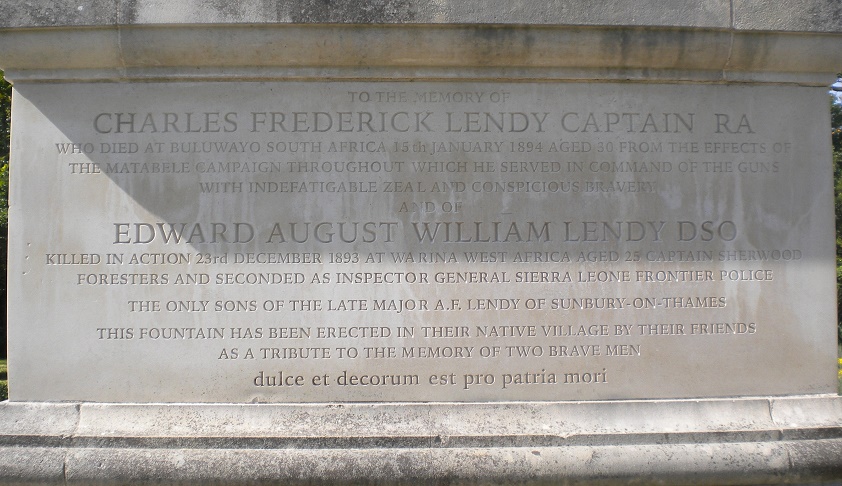Capt. Charles Lendy - 7 January 1863 to 13 January 1894
Charles Frederick LENDY,
the elder son of Auguste and Sophia LENDY, was born at Sunbury on 7
January 1863. He was educated in France, Germany and at Harrow School
from April 1877, to Easter 1878.
He attended the Royal Military Academy at Woolwich and he won a medal4
in an athletics competition against Sandhurst but there is no
information on the medal about the date or event. As a Gentleman Cadet
he was commissioned a Lieutenant in the Royal Artillery on 16 February
1885, and during 1888 he was appointed a French and German interpreter
by the War Office. He served abroad with his regiment in Gibraltar from
September 1883 to October 1887, and in Bermuda from October 1885 to
November 1886. On 16 May 1890, he was seconded to the British South
Africa Compan and he left Southampton for the Cape on board Mexican the
same day. He was promoted to Captain on 15 March, 1892.
In Southern Africa he took a very active and sometimes controversial
role in the Company's military operations and he was in command of light
artillery and Maxim gu.ns, which were used very effectively during
operations against the Matabele. Charles LENDY was appointed a
magistrate on 14 March 1893. He returned to this country at least once
as on 14 October 1889, he told the registrar that his father had died.
Charles LENDY's younger brother, Edward, was also a soldier and he was
killed in action in West Africa during December 1893. The two sons are
remembered by two memorials in Sunbury. One, which was on the bank of
the Thames, London.
Died at Bulawayo, South Africa. Son of the late Major AF Lendy, who
commissioned a statue of a lion for his 2 sons.
On 18 July 1893, having only just arrived at Ft. Victoria from Ft.
Salisbury the day before and therefore in a no-nonsense mood, a
saddle-sore Dr Leander Starr Jameson (he had on-going problems with
piles) informed King Lobengula’s belligerent induna Manyao and his
number two Umgandan, that he would no longer tolerate the unrestrained
hostilities of the 3,500 strong amaNdebele impi against defenceless
Mashona. The butchering of those that Lobengula considered to be his
slaves, amaholi, had to cease immediately, and the impi was to withdraw
across the ‘border’ within the hour, or face being driven across by
force. The impatient Dr Jim tasked forty men under a Captain Lendy to
ensure compliance. Lendy found the hot-headed Umgandan pillaging and
creating general mayhem during the impi’s westward retreat, and at
Magomoli’s kraal, in circumstances which remain unclear, the vastly
outnumbered BSA Company men opened fire on the amaNdebele, killing about
thirty, including Umgandan. It is still generally accepted that this
action precipitated the so-called Matabele War of 1893, when in October
of that year, a column from Ft Salisbury joined the Victoria Rangers
from that fort at Iron Mine Hill, to advance on GuBulawayo and take over
Matabeleland.
Who was Captain Charles Frederick Lendy RA?
Charles Lendy, three sisters and his younger brother Edward (killed in
action in Sierra Leone), were all born in Sunbury-on-Thames in England,
where their French-born father, Major Auguste Lendy, had established the
Institution for Practical Military Education, a preparatory college for
potential Sandhurst applicants. Born on 7 January 1863 and educated in
France, Germany and at Harrow, the athletic Lendy was commissioned into
the Royal Artillery, before serving in Gibraltar and Bermuda.
On 16 May 1893, he was seconded to the British South Africa Company,
sailing for Cape Town straight away. He would command an artillery
platoon, following the Pioneer Column after it had left Bechuanaland for
Mashonaland. Upon the disbandment of the Pioneer Column in Ft Salisbury,
like all the other members of the unit, Lendy claimed his promised
reward of land. The beneficiary was simply allowed to claim ownership of
land that was measured in terms of the distance a man on horseback would
cover a day, in each direction of the compass. Later land surveys
revealed that Lendy ended up with a vast tract of some 70,000 acres in
the Marandellas area.
Prior to being appointed magistrate of Ft Victoria, an administrative
rather than a legal position, Lendy was involved in a number of punitive
patrols in Mashonaland against ‘problematic’ Mashona tribal heads,
including one which resulted in the death of Chief Ngomo (sic) in 1892.
During the raid on a kraal, to find an individual who had stolen from a
Mr Bennett, 21 civilians were killed, an incident which remains a
subject of debate and contention to this day.
Upon his death, Lendy, a master of Maxim machine guns and cannon at
carious engagements against large numbers of amaNdebele warriors, became
both hero and villain, criticised in the House of Commons for disgracing
the name of an Englishman. Shortly before his death, Lendy had written
to Hiram Maxim, the gun’s designer, informing him that his weapon had
performed “admirably throughout, although very inferior ammunition was
sometimes used.” He added that he did not have any stoppages.
Lendy died in Bulawayo Hospital on 13 January 1894, of causes which are
also still debated. It is generally accepted that he died of medical
complications arising out of an internal injury sustained while
competing in the shot putt. Lendy was a fitness fanatic, invariably
carrying around dumbbells for weight training. Some believe it was a
case of over indulgence at the hotel at Tati, and the conspiracy
theorists would have it that Lendy was poisoned by Dr Jameson, in an
attempt by the latter to prevent Lendy from giving evidence at the
inquiry into the circumstances at Ft Victoria which gave rise to the
Matabele War.




Inscription on memorial in London
Charles was replaced as Chief Commissioner of
Police by his elder brother, Major the Hon. Henry Frederick White.
Jameson placed Henry in overall charge of the now titled Rhodesia
Mounted Police for the raid, with the rank of Lieutenant Colonel. Robert
went on the raid still as Chief of Staff. Henry was commissioned in the
Grenadier Guards. Henry had arrived in the country in early 1895.
Early in January 1896, Jameson was overwhelmed by Boer forces before he
reached Johannesburg. Robert and Henry White were taken prisoner.
The prisoners were all shipped to London to stand trial. Robert White
was sentenced to seven months with hard labour, and henry White to five
months. Robert and Henry were dismissed from the British Army, but their
commissions were restored in recognition of meritorious service. Henry
was Mayor of Bulawayo 1899–1900. Henry would later become Brigadier
General the Hon. H.F. White CB, CMG, DSO. Charles distinguished himself
during the Matabele and Mashona rebellions. There appear to be no
further records of Robert later in life.